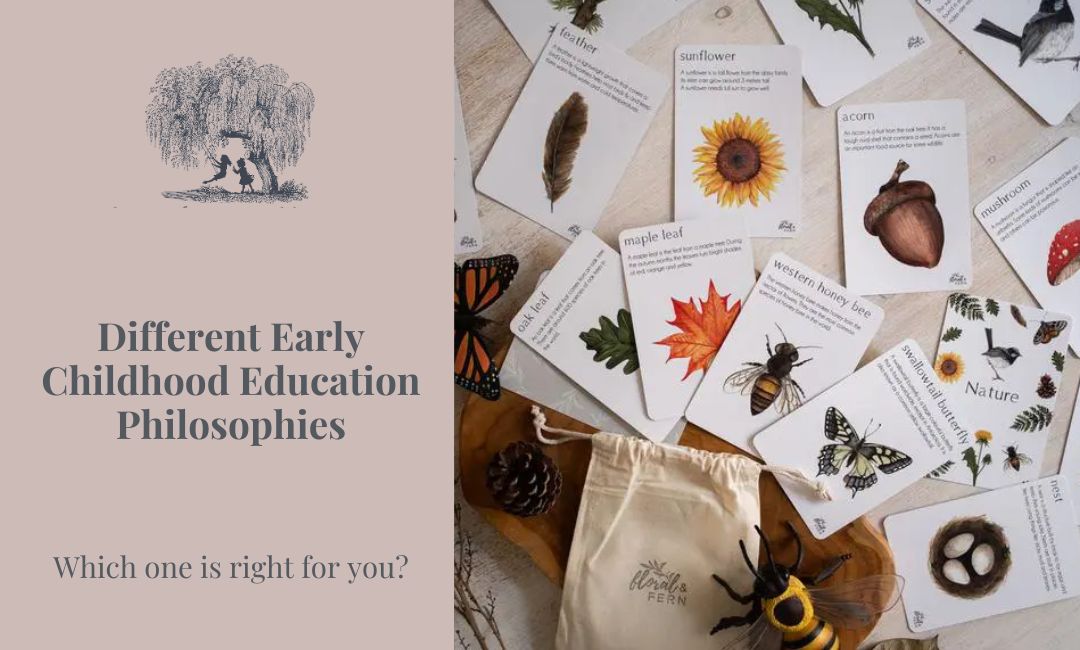There are quite a few different philosophies out there when it comes to early childhood education. These philosophies vary completely from program to program with some educational centres focusing solely on one philosophy and others drawing inspiration from many.
Considering, up to 90% of brain development occurs in the first five years of life. Early learning matters! And so, knowing more about your little one and the different learning philosophies and environments can help you to make the best choices for your child.
When selecting a daycare or preschool for your little one, the educational philosophies or programs they follow may influence which centre you choose.
Keep reading for a brief overview of the most common educational philosophies you may find.
Play-Based
Purposeful play is an important way for little ones to learn. Play-based programs believe that our little one’s are thinkers, reflecting about their world. They gain knowledge by building on a path of ever-increasing knowledge and learn through the process of their efforts. Through purposeful play, they are encouraged to make choices and practice individual decision-making.
A play-based program includes:
- Long periods of uninterrupted play time
- Children following their own interests
- Open-ended play that focuses on the process, rather than the product
Cognitive-Based
In cognitive-based programs, little ones learn through active exploration in an environment which is rich in materials and opportunities to speak, socialize, work, play, and negotiate with others. Classrooms are planned to encourage curiosity, exploration, and problem solving in an atmosphere of warmth, affection, and respect for each child. Educators plan experiences based on the little one’s interests and appropriate educational concepts.
Cognitive-based programs may include:
- A daily schedule of planned activities – both play-based and teacher-led
- Hands-on learning through active exploration
- Activities based on children’s interests
Reggio Emilia
This approach places emphasis on the arts as our little one’s symbolic language and focuses on creating an engaging learning environment. Educators, parents, and children, along with the community, are seen as co-constructors of knowledge. Parents are considered equal partners with teachers in their little one’s education. Reggio Emilia preschools see little one’s as an active citizen and holder of rights from birth, valued for their individual identity and active participation in their learning.
Reggio Emilia programs include:
- “Project-based” curriculum
- Topics for study that are built on the interests of the children
- Groups both large and small that are encouraged to work together to solve problems
An exact replica of Reggio Emilia can’t be recreated outside the town it started in in Italy, as each centre must reflect its cultural, political, and historical context. For this reason, centres refer to themselves as "Reggio-inspired”.
Montessori
Montessori is based on the belief that little ones have a natural desire to learn and when they are placed in an enriched environment with specially designed materials and highly trained educators, they learn quickly and easily through hands on experience. Created by medical doctor and psychiatrist, Dr Maria Montessori. She opened a school for disadvantaged children in early 20th century Rome, to test her education theories. There are now Montessori schools in more than 100 countries.
In Montessori programs:
- Play is the “work of the child”
- Children guide their own learning – building independence and self-esteem
- Children benefit from small-group work and individualized attention
Many Australian early learning services are inspired by Montessori, but not all will be Montessori-registered. Centres can participate in an external review by Montessori Australia against the Montessori quality standards and become “Montessori registered™. Parents can search the Montessori Australia directory to confirm if a service is Montessori-inspired, or Montessori-registered.
Steiner
Steiner education (also known as Waldorf) is based on Rudolf Steiner’s educational philosophy. It originated in Germany in the early 20th century. It is focused on self-directed learning, based on your little one’s interests. Steiner education encourages self-motivated learning that supports and encourages problem solving, critical thinking, creativity, and social skills.
In Steiner programs:
- Learning is self-directed so children’s motivation doesn’t come from rewards.
- Children draw, paint, model, tell stories and do practical things like cooking, cleaning, and gardening.
- Steiner teachers role model rather than instruct and play with children, facilitating their learning.
Parents enrolling their little one in a Steiner-inspired centre will find they have the same teacher to educate and care for their little one throughout their time there.
Regardless of what philosophy you are most drawn to for your little one, the most important things to consider are:
- Your little one’s interests and capabilities
- The centre’s own interests, skills, capabilities, and philosophies
- The curriculum
- Evidence of children’s learning
And! Your little one’s health, safety, and happiness.








